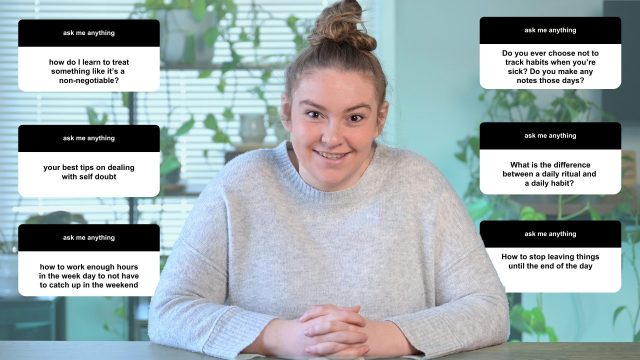It’s time to answer your behavior change questions.
If you’ve been watching our channel, you know that my name is Dr. Karin Nordin, and I am the CEO and founder here at Body Brain Alliance. We’re here to bring you the real science behind self-help.
We have a very active community on Instagram, and every Friday I do a question-and-answer session where people can submit their behavior change questions, and I answer them.
Today, I thought it would be great to bring that format to YouTube and the blog. I’ll be answering some questions our community has submitted and providing off-the-cuff advice on how to address various behavior change issues. Let’s dive in!
If you’d rather watch than read, click here.
Behavior Change Question 1: How do I treat something like it’s a non-negotiable?
Overcoming Obstacles
When we want to treat a behavior as non-negotiable but end up negotiating it, it usually means we’re giving control to something outside of us. For example, if you want to go for a daily walk as a non-negotiable, it’s likely the days when it’s cold or rainy, or when you’re really busy, that you start negotiating that habit. Your first step is to make a plan to anticipate those obstacles. Maybe buy a nice raincoat to stay cozy even on rainy days.
Cognitive Defusion
Learn the skill of cognitive defusion, which helps you separate yourself from your thoughts and treat them as thoughts, not facts. This way, when your brain tries to negotiate out of a habit, you can stop the negotiation in its tracks. We have a bonus workshop inside Change Academy specifically on forming non-negotiables. Check the link in the description for a three-day trial.
Behavior Change Question 2: What are your best tips for dealing with self-doubt?
Embrace Possibility
Doubt and opportunity are two sides of the same coin. If you doubt something will go well, you might also doubt it won’t go well. Give more airtime to positive possibilities. Maybe you’re more qualified than you think.
Take Action Despite Doubt
You don’t need 100% confidence to pursue a goal; you only need 1% confidence in a single moment to take action. Take self-doubt along for the ride. Everything I’ve accomplished, I’ve doubted right up to the moment it happened, but it didn’t stop me from taking action, and it doesn’t have to stop you either.
Behavior Change Question 3: How do I work enough hours in the week day to avoid catching up on the weekend?
Define ‘Enough’
First, define what “enough” means for you. What is enough hours during the weekday to avoid working on the weekend? Focus on increasing the quality of your work rather than the quantity. Working 30 hours at your best can be more productive than 40 hours of distracted work.
Time Management
Check out our blog on time blocking, one of my favorite tools to improve efficiency and manage your time better.
Behavior Change Question 4: How do I stop leaving things until the end of day?
Flip Your Schedule
Try a productivity hack called a “dread sprint.” For the first 30 minutes of your day, tackle the task you usually leave until the end. This reduces procrastination and gives you a sense of accomplishment.
Limit Your To-Do List
Allow yourself to put only one thing on your to-do list at a time. You must complete it before adding anything else. This helps prioritize tasks and reduces procrastination.
Behavior Change Question 5: What’s the difference between a daily habit and a daily ritual?
Understanding Habits, Routines, and Rituals
A habit is a tiny behavior associated with a cue. A routine is a string of habits, and a ritual is a habit or routine with an emotional release behind it. Going to the gym is a routine, not a habit. Treat it as such to improve regularity and effectiveness.
Behavior Change Question 6: Do you track habits when you’re sick?
Binary Tracking
I always track habits as a simple yes or no, regardless of the reason. This avoids adding moral value to the habit. If you have a rocky relationship with consistency, track the days you do the habit and mark the days you don’t. This helps neutralize your relationship with the data.
Let me know in the comments if you liked this style of blog. If you did, I would love to hear a question you have for my next Q&A! Otherwise, I will see you next week.




